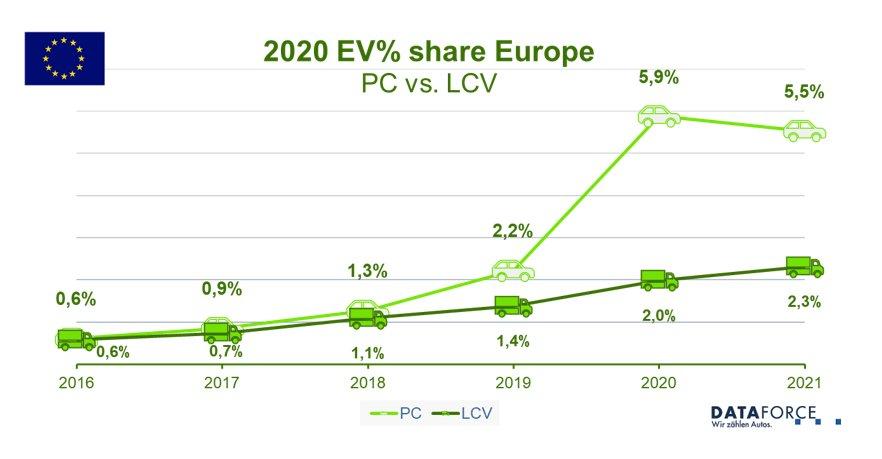Have these widespread wishes / policies led to a sustainable share of electrified transport? If we compare it to passenger vehicles, commercial vehicles are trailing behind at this moment, but a catch up is on the way.
Commercial vehicles & electrification, the market numbers 2020 Europe
In Europe the ratio of commercial vehicles sold with electrical propulsion is trailing behind passenger cars with a 2,0% share vs their 5.9% share over 2020.
The focus of the manufacturers has been on developing electrified passenger cars. Also, from a subsidy point of view, emphasis has also been on passenger cars.
However, with the predominant road occupation transport during the daytime in cities comprises of commercial vehicles you could argue that more focus should or could be put in commercial vehicles. The net impact of an electrical commercial vehicle could well be more than that of a passenger car, which is standing still most of the day.
Some other factors that are potentially influencing the lower penetration of electrical commercial vehicles
- Battery cost vs. weight. To move a full truck, you need a lot of energy, which requires a lot of batteries. And a lot of batteries are still expensive, resulting in a relatively higher cost of ownership vs. the regular diesel vehicles.
- Range vs. usage. Commercial vehicles might be used all day. The range of an electric vehicle might not make it through the whole day, which would result in idling time because of charging. Or an increased number of vehicles so the drivers can swap vehicles.
- Number of vehicles on offer. While in the beginning of the year there were more than 50 (and growing) different passenger cars models on offer, this is not the case for commercial vehicles, which has around 20 different models on offer.
Which models are leading the pack? Both and Renault and Nissan were early out of the gate, just as with passenger cars. This has resulted in the top position for the Renault Kangoo EV with 26% share in 2020, followed by the Nissan e-NV200 with 17%. The Mercedes Vito is 3rd with 6% of the market. Worth mentioning is that in 2019 number 3 was StreetScooter, part of Deutsche Post/DHL, but they decided to discontinue production last year.
The predominant segment for the electrical Vans is the small van segment. As these Vans are more fit for last mile delivery, specifically in older city-centres this trend will most probably not change in the near future.
Although with a trend behind passenger cars, the commercial vehicles are also starting their transitional journey from ICE to EV. All major OEM’s have and will increase their proposition in the markets over the coming years, with the mandatory requirements to keep up with environmental targets. It also opens the door for new players, such as Maxus, which is a brand of the Chinese SAIC group. In the beginning of this 2021 they already achieved a market share of 5.4% among electrical commercial vehicles!
Dataforce is the leading provider of fleet market data and automotive intelligence solutions in Europe. In addition, the company also provides detailed information on sales opportunities for the automotive industry, together with a wide portfolio of information based on primary market research and consulting services. The company is based in Frankfurt, Germany.
Dataforce Verlagsgesellschaft für Business Informationen mbH
Hamburger Allee 14
60486 Frankfurt am Main
Telefon: +49 (69) 95930-0
Telefax: +49 (69) 95930-333
http://www.dataforce.de
Telefon: +49 (69) 95930-329
E-Mail: julian.degroot@dataforce.de
![]()

